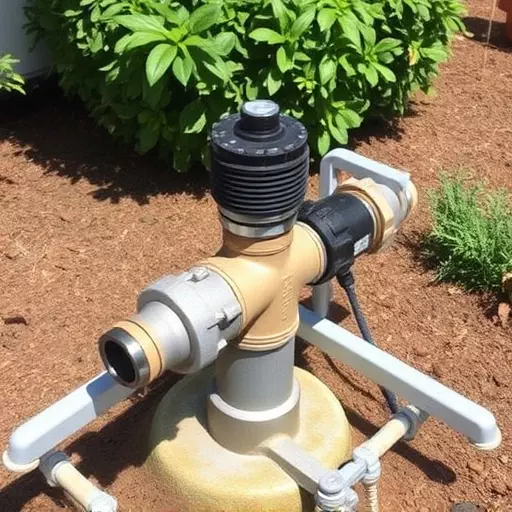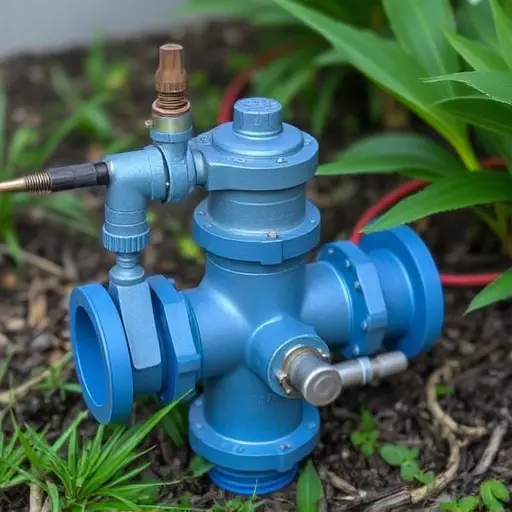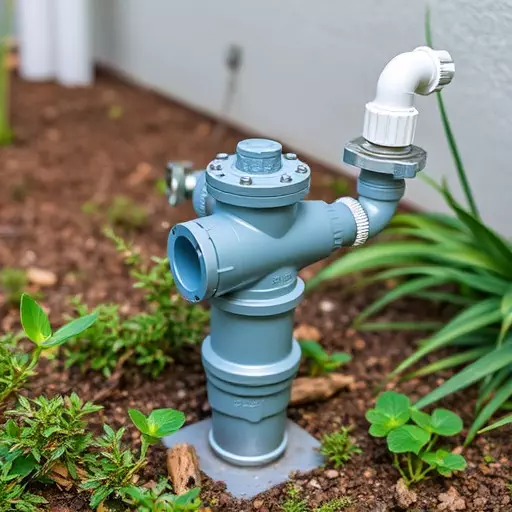Backflow preventers are essential safety devices for all plumbing systems, preventing contamination and ensuring water supply integrity. This guide provides a step-by-step approach to installing commercial and residential backflow preventers in Jacksonville, with key differences highlighted. Selection criteria include water pressure, flow rate, local regulations, and system design. Regular maintenance and annual testing are crucial to ensure these devices function properly, safeguard water supplies, and extend the life of plumbing systems, whether for irrigation or general use. Professional installation and testing services are recommended for both commercial backflow preventer installation Jacksonville and residential setups to maintain safe, clean water.
“Water main backflow preventers are vital components in safeguarding your Jacksonville property’s water supply from potential contamination. This comprehensive guide delves into the crucial role these devices play, offering a clear understanding of their function and importance. We explore the installation processes for both commercial and residential settings, providing a step-by-step approach to ensure compliance with regulations. For irrigation systems specifically, we guide you in selecting the appropriate backflow preventer in Jacksonville, maintaining optimal system performance and water quality. Discover expert tips on maintenance and testing to extend the lifespan of these essential safety mechanisms.”
- Understanding Backflow Preventers: Essential Devices for Safe Water Supply
- Commercial and Residential Installation Processes: A Step-by-Step Guide
- Choosing the Right Backflow Preventer for Irrigation Systems in Jacksonville
- Maintenance and Testing: Ensuring Longevity and Reliability of Your Backflow Preventer
Understanding Backflow Preventers: Essential Devices for Safe Water Supply
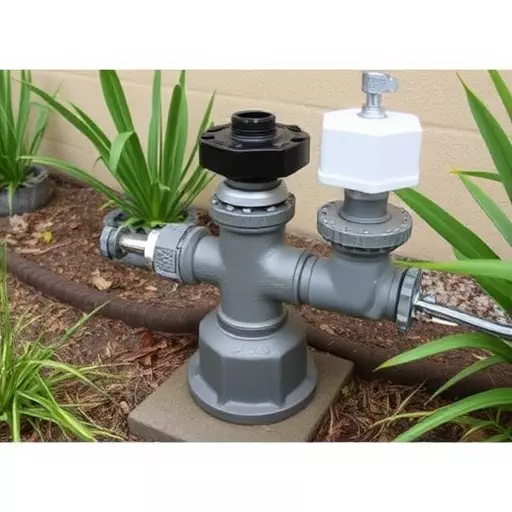
Backflow preventers are critical safety devices designed to protect your water supply from contamination and ensure the integrity of your plumbing system. These essential components work by one-way traffic, allowing water to flow in only one direction – from a clean source to your taps or irrigation systems. Understanding backflow preventers is crucial for anyone involved in commercial or residential backflow preventer installation in Jacksonville, as they serve as a vital line of defense against hazardous conditions.
For instance, in commercial settings with complex plumbing networks, a well-designed backflow preventer installation can safeguard against the introduction of impurities from external sources, such as irrigation systems or backwashed equipment. Similarly, residential installations play a significant role in preventing potential health hazards by blocking contaminated water from flowing back into potable water lines. Whether for commercial backflow preventer installation Jacksonville residents need or residential applications, these devices are an indispensable part of maintaining a safe and reliable water supply.
Commercial and Residential Installation Processes: A Step-by-Step Guide
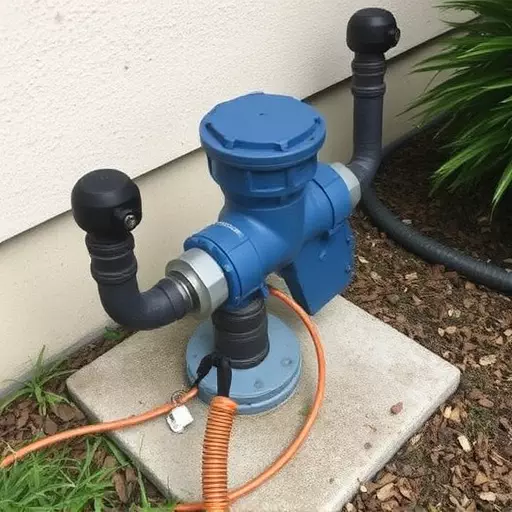
Commercial and Residential Backflow Preventer Installation: A Step-by-Step Guide
The installation process for backflow preventers varies slightly depending on whether you’re tackling a commercial or residential project (or irrigation system). However, both share essential steps aimed at ensuring safe water supply. For commercial backflow preventer installation Jacksonville professionals recommend starting with identifying the specific type of backflow preventer needed based on water pressure and flow rate. Next, locate the optimal position for the device, often near the water source or main supply line. Proper mounting is crucial, ensuring secure attachment to a sturdy surface.
Following that, carefully thread the water lines through the preventer, ensuring tight connections using appropriate tools. Then, activate the preventer according to manufacturer guidelines, testing its functionality with pressure tests. In residential backflow preventer installation, homeowners should also verify local building codes and regulations before purchasing and installing a device. Similar steps apply: select the suitable preventer, position it strategically, mount securely, connect water lines accurately, and conduct final testing for optimal protection against harmful backflow.
Choosing the Right Backflow Preventer for Irrigation Systems in Jacksonville
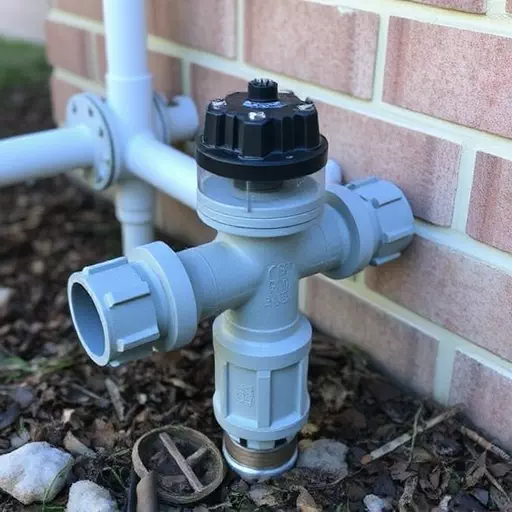
Choosing the right backflow preventer for irrigation systems in Jacksonville is crucial for maintaining water quality and preventing contamination. When selecting a commercial or residential backflow preventer, consider factors like system design, water pressure, flow rate, and specific regulations set by local authorities. A professional installer can help navigate these considerations to ensure compliance with Jacksonville’s standards for irrigation backflow preventer installation.
In Jacksonville, the type of backflow preventer often depends on whether it’s a commercial or residential property. Commercial installations may require more robust devices that can handle higher pressures and flow rates, while residential systems might opt for simpler, yet effective, models tailored to smaller-scale applications. Proper selection is key to preventing hazardous backflow and ensuring the longevity of your irrigation system.
Maintenance and Testing: Ensuring Longevity and Reliability of Your Backflow Preventer

Regular maintenance and testing are essential to ensure the longevity and reliability of your backflow preventer, whether it’s for commercial backflow preventer installation Jacksonville or residential setups. These devices play a crucial role in safeguarding your water supply by preventing contaminated water from flowing back into the main system. A simple yet effective practice is to check the backflow preventer’s components regularly for any signs of wear and tear. This includes inspecting valves, connections, and seals for leaks or damage. Additionally, testing the device at least annually is vital. Many professionals offer irrigation backflow preventer installation services, which include conducting thorough tests to ensure the preventer operates smoothly and effectively, thereby maintaining the integrity of your water system.
Proper testing involves simulating various scenarios to assess the preventer’s performance. This may include checking for proper shut-off, leak detection, and pressure relief mechanisms. By keeping up with these maintenance tasks, homeowners and business owners can extend the life of their backflow preventers, ensuring safe and clean water for years to come. Regular care also helps in avoiding costly repairs or replacements, making it a wise investment for any property.
